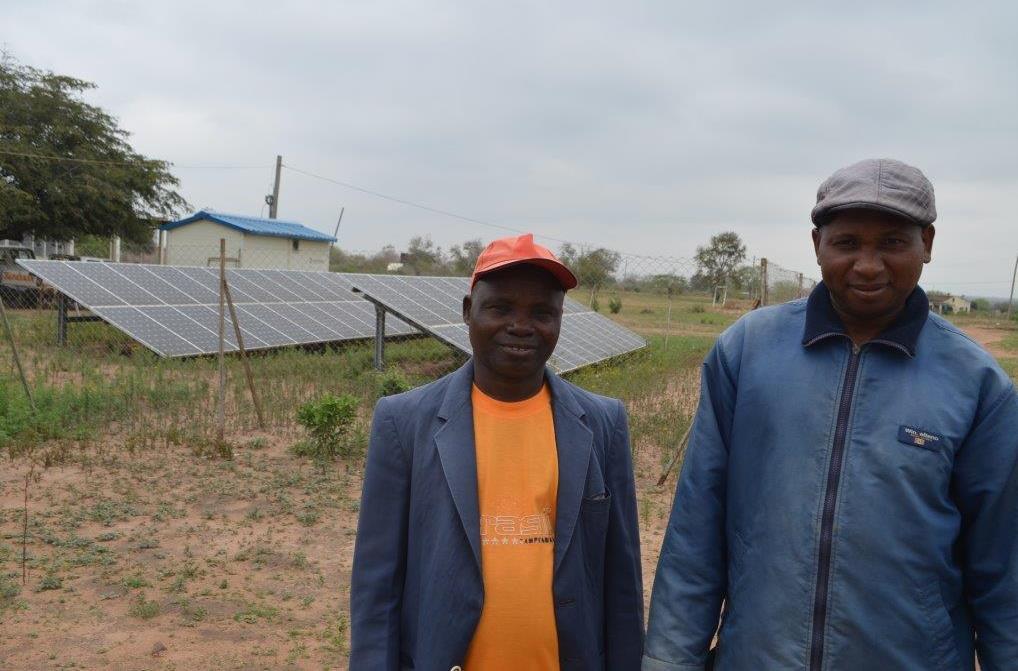PROVIDING SOLAR ENERGY FOR OFF-GRID COMMUNITIES IN RURAL MOZAMBIQUE: BTC/FUNAE ASSESSMENT MISSION
To improve and promote access to modern and renewable energy in Mozambique,
BTC cooperates closely with the Mozambican national energy institution (Fundo de Energia - FUNAE) since 2010. In
this light, the RERD project (Renewable Energy for Rural Development) was
created, focusing on access to energy in rural areas. For this project, a team
of international experts recently conducted a market study to find renewable energy
solutions for off-grid communities in rural Mozambique. The study also looked
into the potential role FUNAE could play in promoting private sector engagement
in the renewable energy market.
According to the study, one option lies in creating favourable conditions
to privatize renewable energy solutions in off-grid communities.
Three pilot projects were proposed:
1.
Pay-as-you-go: consumers are connected to solar
mini-grids and pay by mobile phone for the amount of energy they consume.
Privatizing solar mini-grids would ensure a fully operational and stable energy
system with regular maintenance, as the private companies who receive a license
to manage the mini-grids would depend on the energy consumption of their
clients in order to make their business sustainable and economically viable.
2.
Solar Battery Charging Stations: a solar battery
charging station is installed by a private company in the community, and
consumers invest in a portable battery that they can recharge at the charging
station for a small fee. This battery then provides the households with energy.
The private company ensures maintenance of the charging station and of the
batteries purchased by their clients.
3.
Photovoltaic systems (PV system) and maintenance:
consumers can invest in individual solar panel systems for their own household
and the private company selling these PV systems provides regular maintenance.
In the light of these pilot projects, BTC and FUNAE have conducted an
assessment mission on 19 October 2016 to Porto Henrique – a little village of
around 1000 people located in the Maputo province, Mozambique. Here, solar
panels and a 10kW mini-grid were installed for FUNAE with South Korean funds in
2011. This installation also received a monitoring device from the RERD project
that allows the functioning of the system to be monitored online.
Although the system was working well for a while, it broke down and has
not been fully operational for a few months. A damaged transformer and expired
batteries prohibit the energy collected by the solar panels to be stored
properly, and the local technicians of the village do not have the means to
repair or replace the broken components. As a result, the people living in Porto
Henrique that are connected to this mini-grid only have electricity on a sunny
day. Apart from being a grave inconvenience for inhabitants, this lack of
reliable electricity also complicates matters for the public institutions in
the village: the classrooms of the local school are dark on cloudy days, making
it difficult for students to read and write, and the local health center
depends on a steady flow of electricity to treat its patients. Lastly, the
majority of the village is not connected to the mini-grid at all: houses and
other buildings in the community are very dispersed, making it difficult and costly
to connect them all directly to the solar mini-grid. For these people, having
no access to electricity is the harsh reality.
For these reasons, Porto Henrique has the potential to be a good
test-site to launch one or more of the pilot projects:
Handing over the existing solar mini-grid to a private operator with a
pay-as-you-go payment system would be possible, as most of the inhabitants have
a mobile phone to make mobile payments, and reception is very good thanks to a
network antenna located in the village.
Alternatively, the distribution of batteries in combination with the installation
of a solar charging station would also be a viable option, as it would not
require the widely dispersed houses to be connected to the mini-grid.
Lastly, interviewed residents of the village said they would also
consider investing in a private PV-system. A local shop owner for example said
that, despite being connected to the mini-grid, he regularly spends money on
propane gas in order to run his fridge to keep his products cold, while every weekend
he buys gasoline to run his generator to play some music for the village. For
him, investing in a private PV-system would be a viable option that would save
him money in the long run.
It remains to be seen to what extent private companies are interested in
tapping into this energy market, but it could be a profitable one: the
potential of the PV systems business in rural Mozambique is estimated as large
as 1.5-2 billion USD. In order to attract private companies, some of the
projects might need to be partially subsidised as an incentive for companies to
make the initial investments. However, if one or more of the pilot projects
prove to be successful and profitable, they will ultimately be implemented on a
national level, providing reliable, clean energy for millions of people living
off the grid in rural Mozambique.
Dernières actualité de ce projet
Pas d'actualité

